An Ahref study reveals that 96.55% of pages get absolutely zero traffic from organic Google search.
Any website that does not show up on Google is practically worth nothing. Because without Google indexing there is no traffic or visitors to learn about you. That is when you find yourself asking, Why is my website not showing up on Google? or Why is my URL not showing up on Google?
If you previously had traffic and visibility on Google and now do not, it might be due to penalties triggered by unethical practices.
Fortunately, understanding the reasons behind this problem can lead you to effective solutions. So, stick till the end to learn all about the reasons you are missing out on valuable traffic and clicks.
What are the Common Reasons Your Website is Not Showing Up on Google?
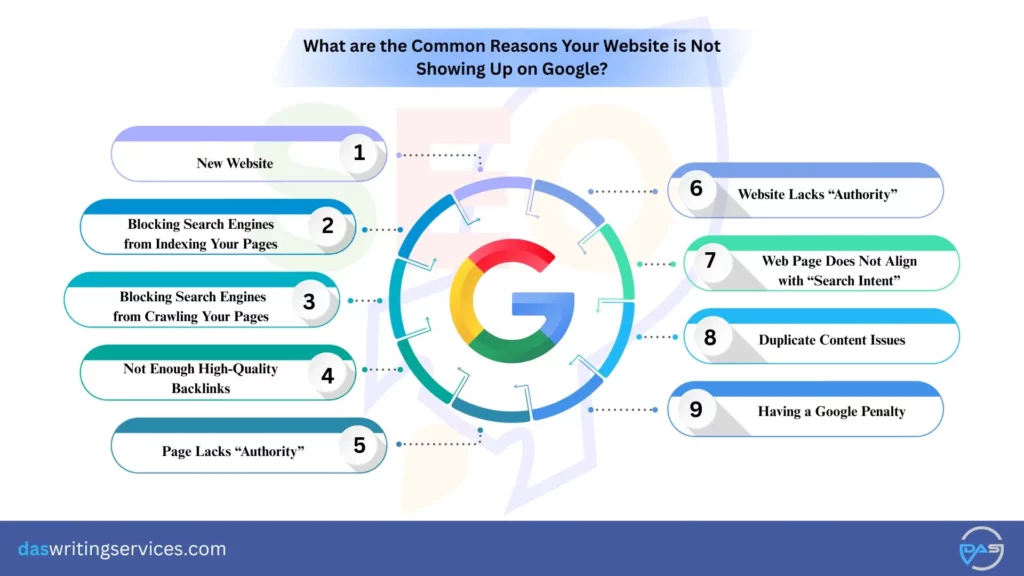
When your website is missing from Google search results, there are usually a few key factors at play. Let us go through them:
1. New Website
If you have recently launched your website, it may not show up on Google right away. New websites take between 3-6 months to get indexed by Google.
Google’s bots, which crawl and index the web, may not have discovered your site yet. As a new website, you need to give Google some time to find and understand your website before it can appear in search results.
You can help speed up the process by submitting your site’s URL to Google via Google Search Console, which helps notify Google of your site’s existence. But it sure can take some time.
If you want your new site to get quickly listed on Google, creating content can do that job for you. Reach out to us to learn how we can help.
2. Blocking Search Engines from Indexing Your Pages
One common issue is accidentally preventing search engines from indexing your website. If your website contains a `noindex` directive in the meta tags of specific pages or even site-wide, it tells Google not to index those pages.

This could happen if you have set certain preferences in your CMS (such as WordPress) or directly in the website’s code, which could prevent your content from appearing on Google. Check your CMS settings or HTML code for any `noindex` tags and remove them if they are mistakenly in place.
3. Blocking Search Engines from Crawling Your Pages
For Google to index your website, its crawlers must be able to access all the relevant pages. However, if your `robots.txt` file is improperly configured, it could be blocking Google from crawling sections of or your entire site.
This happens if you have restricted access to certain directories or pages that Google needs to see. Without being crawled, your pages will not get indexed or show up in search results.
Review your `robots.txt` file to ensure it allows Googlebot to crawl all essential parts of your site. Make sure no crucial pages are being restricted from crawling.
4. Not Enough High-Quality Backlinks
Google relies heavily on backlinks to determine a website’s authority and relevance. Websites that get 4 -5 high-quality backlinks per month from authoritative sources are 2.5 times more likely to rank higher in search results.
If your site does not have enough credible backlinks, Google may not consider it important enough to display against competitive search queries. It is not just about quantity, quality is key, too.
Focus on building backlinks from reputable websites in your industry. Create valuable content that others will want to link to, such as in-depth guides, infographics, or original research backed theses.
5. Page Lacks “Authority”
Even if your website has good content, individual pages may not have enough authority to rank. Authority of a specific page is determined by factors like backlinks pointing to that page, user engagement, and how well the content matches the search query.
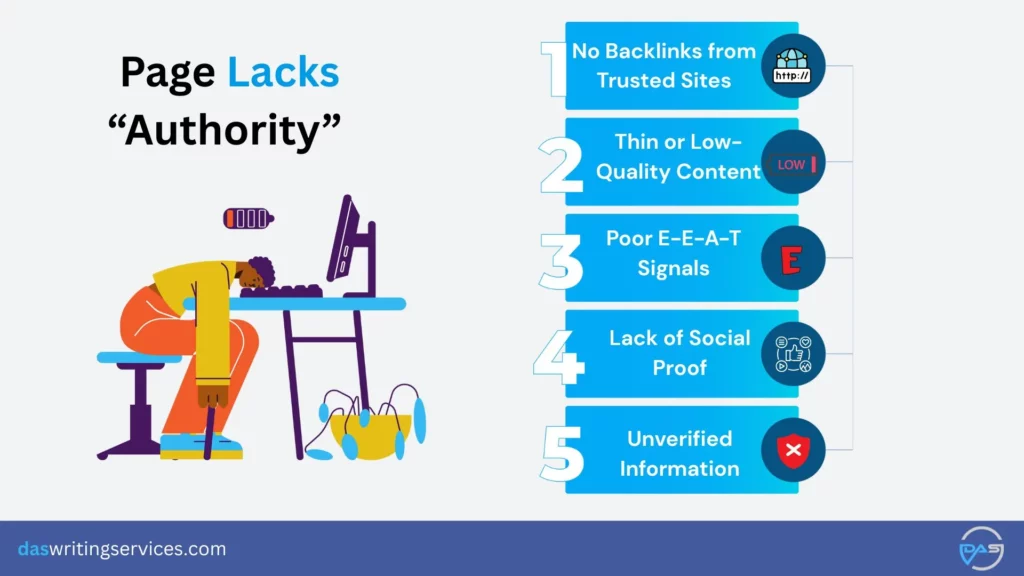
Without enough authority, your page might not rank on the first few pages of Google, leading to minimal visibility.
Build internal links to the page from other relevant sections of your website. Also, focus on earning external backlinks to improve the authority of the page.
6. Website Lacks “Authority”
While individual pages need authority, the overall domain authority of your website also plays a role. New websites typically start with 0 or 1 domain authority because they haven’t had time to build up backlinks or brand recognition.
While top websites have 90+ DA, for a one year old site, having a DA between 10-20 is good enough to keep at it. Remember, DA is a composite metric that reflects how trustworthy and authoritative Google perceives your entire website to be.
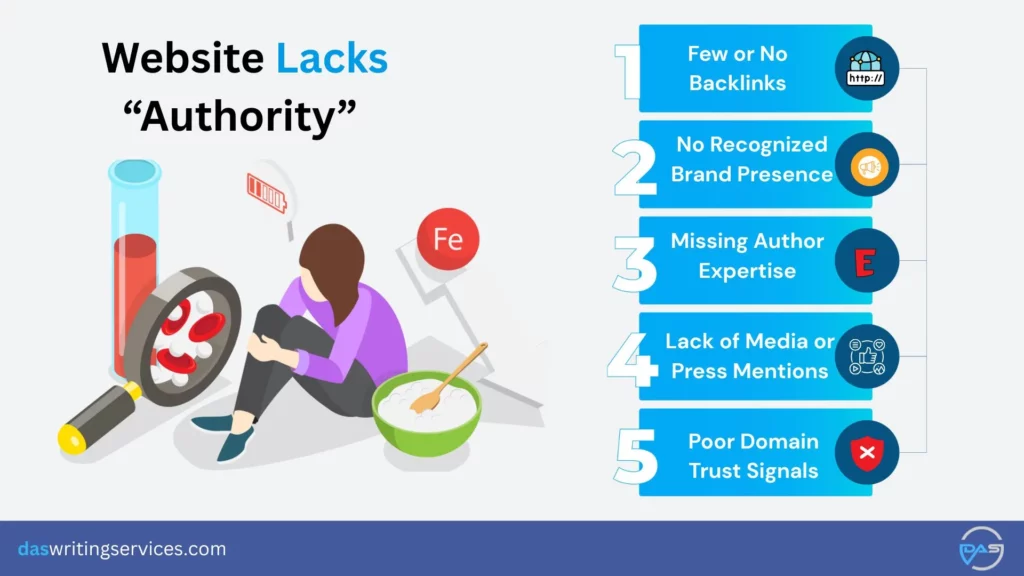
DA depends on multiple factors such as domain age, quality of content, trust signals, number of backlinks, brand authority and so on. Focus on publishing high-quality, authoritative content that provides value to your audience. Over time, as more people link to your site, your domain authority will improve.
7. Web Page Does Not Align with “Search Intent”
Google’s algorithms are designed to understand the intent behind users’ searches. If your page does not match the search intent, whether users are looking for information, a product, or a solution, Google may not rank it for relevant queries.
For example, if someone searches for “how to fix a leaking faucet” and your page is about selling faucets without offering helpful information, it may not rank well.
Read Our Related Blogs:
- How to Adapt to AI Overview in Web Content Marketing?
- How to Optimize your Content for Search Engines?
Make sure your content aligns with the user’s search intent. For informational queries, provide detailed, helpful answers. For transactional queries, ensure your page offers the right products or services along with quick checkout options.
8. Duplicate Content Issues
Duplicate content can cause Google to penalise your site, leading to lower rankings or even removal from search results. This type of content confuses Google’s crawlers, making it difficult for them to decide which version of a page to rank.
This could happen if you have multiple URLs for the same content, or if your content is too similar to other pages on the web.
Use tools like Google Search Console to identify duplicate content issues. Consider implementing canonical tags to tell Google which version of a page should get importance.
9. Having a Google Penalty
Violating Google’s webmaster guidelines, whether intentionally or unintentionally, can result in a manual penalty. Penalties can drastically reduce your site’s visibility or even remove it from search results entirely. Common causes include engaging in black-hat SEO practices like keyword stuffing, using hidden text, or acquiring spammy backlinks.
Check Google Search Console for any manual penalties or messages from Google. If you find that your website has been penalised, address the issues immediately and submit a reconsideration request.
Things to Do If Your Website is Not Showing in Google
With more than 200 million active websites all over the globe, your website is not showing up on Google is not surprising. A bit unfortunate, but not surprising. But hey! You can always change that from happening by implementing these pointers:
1. Verify Search Engine Indexing
One of the simplest ways to see if your site is indexed is by searching for `site:yourdomain.com` on Google. This search will show you all the pages Google has indexed from your website.
If nothing appears, your site has not been indexed. If your site is not indexed, use Google Search Console to submit your sitemap. This lets Google know which pages you want to be indexed.
2. Submit to Google Search Console
Google Search Console is a free tool that allows you to submit your sitemap and individual URLs for indexing. If your website is new or recently updated, submitting it via Search Console can help Google crawl and index your content more quickly.
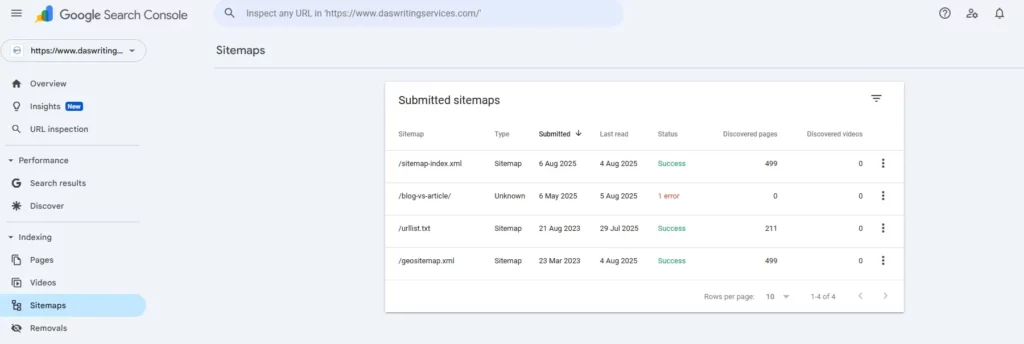
3. Keyword Optimisation
Relevant keywords help Google understand what your page is about and determine when it should be shown on search results. If your content does not contain appropriate keywords for a topic, you may miss out on valuable search traffic.
Ensure that you are naturally incorporating keywords like “Why does my website not show up on Google” or “Why my site is not appearing in Google search” into your content, but avoid keyword stuffing. The key is to maintain a healthy keyword density, somewhere between 0.5 to 0.9% of the total content length.
4. Allow Search Engine Crawling
If your `robots.txt` file or meta tags are preventing search engines from crawling or indexing your site, it will not show up in Google’s search results. A small misconfiguration could block entire sections of your website from being visible to search engines.

Use Google’s robots.txt tester and review your meta tags to ensure they are not accidentally blocking important pages.
5. Global Accessibility Check
Technical issues like slow loading times, server errors, or mobile-friendliness problems can prevent your website from being indexed properly. Google prioritises websites that load quickly and are easy to navigate, especially on mobile devices.
Test your site using Google’s Mobile-Friendly Test and Page Speed Insights to ensure it performs well across all devices and regions.
6. Regularly Upload Fresh Content
Consistently adding new content to your website, such as blogs, articles, or updated product pages, signals to Google that your website is active and relevant. Adding at least 10+ new content improve your organic visibility by at least 30% because Google prefers websites that frequently provide fresh and useful content.
Blogging or creating relevant, SEO-optimized content is a great way to boost your site’s organic visibility. Create a content schedule that allows you to regularly post new blogs, articles, or updates. Ensure your new content is well-optimized for SEO with relevant keywords and provides value to your target audience.
Are you struggling to create content at scale? Leave the content woes to the experts. Connect with us to get a customized content strategy that engineers your growth journey!
7. Content Quality Control
Fixing content issues is critical for improving your site’s visibility. Duplicate content, thin content, or irrelevant pages can all hurt your rankings. Google values original, informative content that provides real value to users.
Review your site for duplicate content or low-quality pages and improve them. If necessary, consolidate similar pages and use canonical tags to resolve duplicate content issues.
8. Manual Penalty Check
Manual penalties are issued when your website violates Google’s guidelines. Penalties can prevent your site from appearing in search results entirely, which is why it is important to check Google Search Console for any manual actions taken against your domain.
If you have a manual penalty, resolve the issue and submit a reconsideration request to Google. Follow Google’s guidelines closely to avoid future penalties.
9. Target Less Competitive Keywords
If you are trying to rank for very competitive keywords, it might be difficult for your website to appear on the first page of Google, especially if your site is new or lacks considerable domain authority. Instead, targeting long-tail keywords, which are more specific and less competitive, can help you rank faster.
Use keyword research tools such as Ahrefs or Wordstream to find less competitive, high-intent keywords that you can target in your content. Focus on phrases that have lower competition but still attract relevant traffic.
10. Page Speed Optimization
Site speed is an important ranking factor for Google. Websites that load slowly provide a poor user experience and are less likely to rank well in search results. Additionally, Google has shifted towards prioritising mobile page speed, so ensuring fast load times on all devices is essential.
Use Google PageSpeed Insights to analyse your website’s speed and performance. Optimise your images, minimise code, and consider using a content delivery network (CDN) to improve load times.
11. Build High-Quality Backlinks
Backlinks are essential for improving your site’s authority and rankings. High-quality backlinks from trusted websites signal to Google that your site is valuable and relevant to users. Without backlinks, it is much harder to rank in competitive search results.
Reach out to reputable websites in your industry for guest posting opportunities or collaborations. Focus on creating link-worthy content like original research, how-to guides, and infographics.
12. SEO Audit and Optimization
On-page Search Engine Optimisation is critical for ensuring that your website ranks well in search results. This includes optimising your titles, meta descriptions, headers, and internal linking structure. Off-page SEO, such as building backlinks, is also essential for improving your website’s overall authority.
Ensure your pages are optimised for SEO with relevant keywords, clear structure, and user-friendly navigation. Regularly review your SEO strategy and adjust it as necessary to keep up with changes in search algorithms.
Takeaway
If you are wondering ‘why is my website not showing up on Google search results’, it can be caused by several factors, ranging from technical SEO issues to lack of authority. However, regular monitoring and optimization using tools like Google Search Console will help you stay on top of your visibility game and help attract and retain users.
With the right strategy and consistent effort, you can resolve these issues and make your website more discoverable on Google.
Frequently Asked Questions
Yes, duplicate content can negatively affect your website’s ranking. Google may not show your pages in search results if it finds duplicate or thin content on your site.
You can submit your website to Google via Google Search Console. Add your website to the console and submit a sitemap to help Google index your pages faster.
Manual penalties are issued by Google when your website violates its guidelines. These penalties can prevent your site from appearing in search results. You can check for manual penalties in the Google Search Console.
While a lack of backlinks may not prevent your site from being indexed, backlinks are important for ranking well in search results. High-quality backlinks from reputable websites can significantly improve your visibility on Google.
Yes, regularly updating your website with fresh content like blogs or articles signals to Google that your site is active and relevant. This can improve your ranking over time.
Subhodip Das is the founder and CEO of Das Writing Services Pvt. Ltd. He has an experience of 12 years in the field of Digital Marketing and specialises in Content Writing and Marketing Strategies. He has worked with well-established organisations and startups helping them achieve increased Search Engine Rank visibility. If you want to grow your business online, you can reach out to him here.
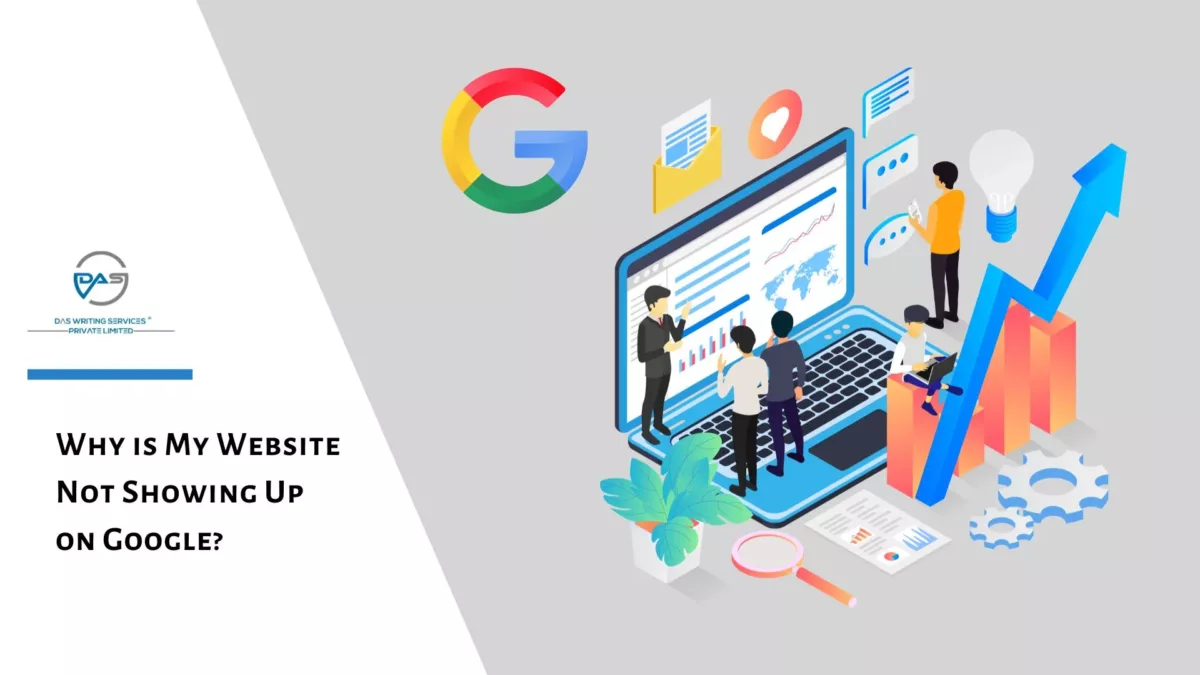


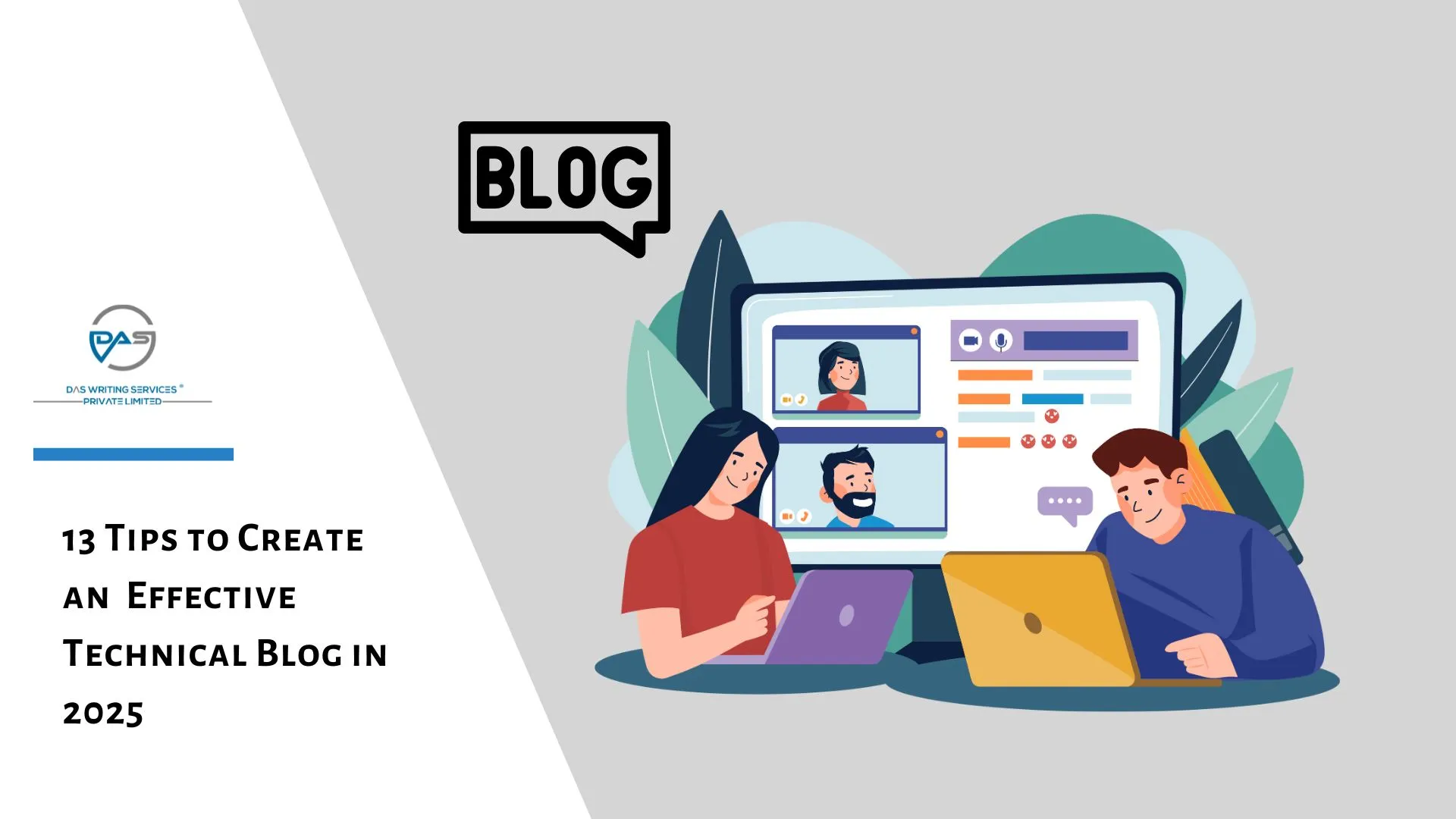
Leave a comment